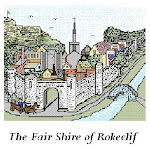Rokeclif, Northshield, March 2009
The Medieval Machine: The Industrial Revolution of the Middle Ages
Jean Gimpel
Working at a bookshop, I can’t help but note that as many shelves of books on history as we have, there are just as many shelves devoted specifically to military history. Whether due to the plethora of documentation or human nature, often history has focused on war and victors. In classes it is too often the place and date of battles that we are asked to memorize and the wonder of the full tapestry of history is lost. Jean Gimpel has taken a little studied facet of the history of Western civilization and expounded his findings into a book with a refreshing change of focus.
Beyond dismissing the stereotype of ‘dark ages’, Gimpel argues that the breadth of inventions and advances seen in the middle ages outpaced what later came during the Renaissance and in fact should be seen as the true Industrial Revolution of Western history. He covers first medieval energy sources and the harnessing of water and wind power. The emphasis is on how the water mills, dams, and windmills of the middle ages taped the potential of these energies to a far greater degree that the works of the early Roman Empire. Given the general notion of the Middle Ages being a low time between two greater periods of history, Gimpel often makes a point of the industry of the Middle Ages outshining the supposed glory of Roman era.
Agriculture and mining are each given a chapter to showcase the advances of the Middle Ages. Within each topic he focuses on the strides made to increase crop yield and to streamline labor practices. The author contrasts Rome’s use of slave labor and enjoyment of a milder climate to the technological drive of the Middle Ages impelled by a harsher climate and lower population density. He sees the adage of “what does not kill a person makes one stronger” at work in Western Europe.
Gimpel goes further than a simple history of European technology to give a social assessment of the Middle Ages that is far more optimistic than most. He highlights aspects of society, such as miners and stone workers, who grew in status and wealth. While most teachings on the Middle Ages paint the picture of a rigid society with a tight focus on religion, this book focuses on free thinkers and inventors. Indeed, the author makes the claim that free thought and inventiveness actually declined with the onset of the Renaissance. In large part this claim is based on the idea of advances during the Renaissance being focused on the waging of war rather than the betterment of daily life and society. While I wasn’t convinced of this broad point, the book does provide a wealth of new information and interesting views I’ve not found elsewhere.
A goodly amount of space at both the front and end of the book is spent comparing the decline of the Middle Ages with what he sees as a decline of our current society. As this book was written thirty years ago, take away what you will from his modern day tie ins. The topic of Gimpel’s book was fascinating and his tract well researched. I fully intend to read more on the matter of industrial archeology prior to the better known, steam driven, Industrial Revolution and if this aspect of history interests others I would say to give The Medieval Machine a read through.
Amata Cromwell


No comments:
Post a Comment